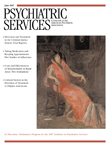Evidence-Based Practices in Mental Health: Debate and Dialogue on the Fundamental Questions
As I read a professional text such as Evidence-Based Practices in Mental Health, the thought occurs to me that I wish to see a live staging of the material I am reading. Most of what I read for work is a bit dry for that sort of treatment, though there are exceptions: fine clinical narratives, first-person accounts, and the like. But this book is unique, and, although you may wonder at my fancy, I hope my explanation will help you to understand my wish, and more substantively, to appreciate this text and why it is important to mental health practice.
Like me, you may have found yourself wondering why outcomes in your practice don't follow the predicted course charted by the literature or why patients you see don't conform to traditional nosology. And you may have worried whether, with your particular background and training, you are providing the best evidence-based practice or found that insurers or regulators with whom you interact are threatening not to pay for treatment that does not meet an evidence-based practice standard. You may even have read about controversies within the academic community regarding the validity, or advisability, of translating evidence-based practices into standard clinical settings ( 1 ).
If so, you will be intrigued, even fascinated, by this book, which seeks to objectively explore these and other questions. In so doing, the book helps to guide our allied professions toward a future when we may hope to treat patients effectively, consistently, and humanely, with individuality and respect for the uniqueness of each patient, each clinician, and each clinical context.
The editors, who each also contribute a chapter, set as their agenda the examination of "nine fundamental questions" facing the mental health field with regard to the adoption of evidence-based practices in clinical settings. Chapters include "What Qualifies as Evidence of Effective Practice?" "Does Manualization Improve Therapy Outcomes?" "Are Research Patients and Clinical Trials Representative of Clinical Practice?" "What Should Be Validated?" and so forth. Respected practitioners and researchers were recruited to contribute position papers, which form a kind of pro-and-con debate, as many of us have previously seen in journals. What is unique about this format is both the depth of examination, the breadth of perspectives, and the effort at the conclusion of each chapter to have the contributors critique their own arguments, and the others within that segment, and attempt to find consensus, or at least rational convergence.
The aim of this book is not to settle issues, and I left my reading of some chapters with much uncertainty, even impatience. But that was what was most exciting about reading this work, an exciting debate that the contributors and editors have achieved with singular success. As a result, I hungered for more discussion and an opportunity to interact with these distinguished colleagues, because these issues matter a great deal, and I want to understand even more.
1. Tanenbaum SJ: Evidence-based practice as mental health policy: three controversies and a caveat. Health Affairs 24:163–173, 2005Google Scholar



